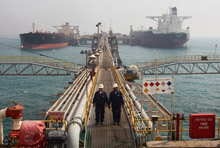
Typical street scene in Santa Ana, El Salvador. (Photo: iStock)
IMF Survey: IMF Provides $3.6 Billion Loan to Iraq
March 4, 2010
- Two-year deal to support Iraq
- Policy reforms to strengthen economic outlook
- Rising oil prices and production will help the economy
The IMF approved a $3.6 billion loan to help Iraq as it struggles with high deficits and falling government revenues due to lower than anticipated oil prices, the organization said.

Oil tankers in Basra: an IMF loan will help Iraq’s economy, hurt by low oil prices (photo: Essam Al-Sudani/AFP)
GLOBAL ECONOMIC CRISIS
The money will help Iraq implement its two-year economic plan, which includes
• Improved public financial management and budget implementation
• Increased transparency and accountability in the oil industry
• Banking sector reforms.
Iraq’s economic growth slowed to 4 percent in 2009, but is expected to climb to 8 percent in the coming years as oil production increases gradually, according to the IMF.
“The economic program for 2010 and 2011 aims at providing a sound macroeconomic framework during a period of economic and political uncertainties. Consistent with this program, the 2010 budget adopted by parliament seeks to contain current spending while increasing investment to address Iraq’s large rehabilitation needs and improve public service delivery,” said IMF Deputy Managing Director Takatoshi Kato.
The loan comes just ahead of parliamentary elections in Iraq, scheduled for the first week of March.
Savings funded a difficult year
Iraq’s economy has been seriously affected by the drop in oil prices from their peak levels in 2008, the IMF said. With oil revenues accounting for the bulk of the country’s export receipts and government revenues, both the balance of payments and the budget saw large deficits in 2009. Thanks to savings built up in earlier years, these deficits could be financed.
In 2010 and 2011, the funds from the IMF will be used to support Iraq’s budget and to help pay for imports. Current government spending will be contained over the next two years in order to make room for higher investment and gradually reduce the deficit, and Iraq is expected to begin running a surplus again in 2010, the IMF said.
Turnaround hinges on oil prices
Oil prices have been climbing in recent months, and may turn out to be higher than expected over the course of the next two years.
If this is the case, Iraq’s funding needs will likely be temporary and the Iraqi government has said they intend to treat the loan as precautionary if it becomes evident oil revenues would increase to levels that would make the funding unnecessary. Iraq’s medium-term outlook remains favorable as oil production is projected to increase in the coming years, as domestic and foreign investment will start to bear fruit.







